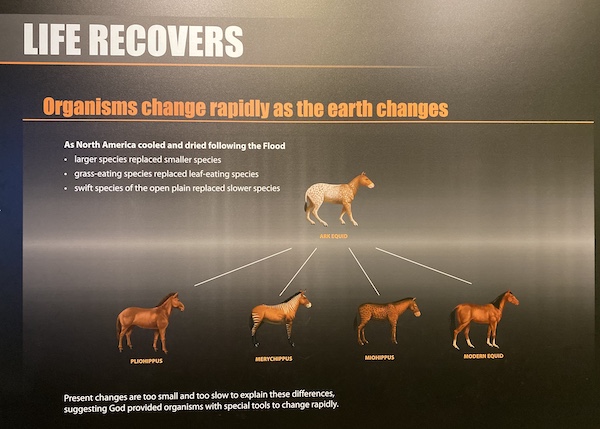When I signed up to attend a 3-day conference at the flagship young-Earth creationist organization Answers in Genesis, I assumed I would be the only person wearing a mask. I was right—kind of. Although none of my fellow attendees was masked up, several were on sale in the vendor area. Playfully called “Reformed Masks,” one featuring theologian and conservative radio personality R.C. Sproul was captioned, “What’s wrong with you people?” Another depicted televangelist Kenneth Copeland spitting at spiked Covid-19 particles with the caption, “Blow it away!”

Image courtesy of the author.
While the conference itself—aimed at pastors and church leaders concerned with “raising Godly generations”—was patently not about Covid-19, the speaker list and book offerings were a who’s who of anti-vaccine and anti-mask-mandate evangelicals. All conference registrants received a book defending gender complementarianism by John MacArthur, a pastor who has denied the very existence of the pandemic and whose church has made headlines for defying California’s bans on large gatherings. During his closing remarks, Ken Ham lauded Louisiana State Representative Mike Johnson—who has vocally opposed vaccine mandates—as one of the only “godly men” in Washington, DC.
A July study from PRRI found that white evangelicals were the American religious group most likely to indicate outright refusal to take a Covid-19 vaccine, while a number of other studies have also found that number hovering close to 25 percent. Journalists and academics alike have attempted to make sense of this discrepancy, pointing to existential fear, anti-intellectualism, and Christian nationalism as potential influences on American evangelicals’ vaccine antipathy.
As a scholar of American evangelicalism and media, I am inclined to agree with all of these insights, but my experience at this week’s Answers in Genesis conference reminded me of the system that fuels it all. American evangelicals’ deep-seated us-versus-them narrative is one that can set its crosshairs on any subject, particularly when facilitated by a sophisticated right-wing media machine that’s already gained evangelicals’ trust.
Take Answers in Genesis as an example. Ken Ham’s young-Earth creationist empire—replete with a Creation Museum, a Noah’s Ark theme park, a planned Tower of Babel attraction, homeschooling and Sunday School curricula, and even its own TV streaming service—is based on the concept that “mainstream” science is fundamentally flawed in its approach to evidence.
Secular scientists might claim that they allow observation and replicable experimentation to dictate their conclusions, but Answers in Genesis argues that scientists are deluding themselves about their true “starting point.”
Ham famously argues that there are only two religions—conservative Christianity based on a literal and univocal reading of God’s word and secular humanism derived from “man’s word.” At this week’s conference, he went a step further, claiming that secular scientists cannot claim a “neutral position,” because any worldview that is not actively in service of his version of orthodox Christianity is “hostile” to God and “desperately wicked” in its thinking.
“If it’s not for Christ, it’s against,” Ham told a cheering audience.
In this view, the concept of a “starting point” assumes a place of primacy. Answers in Genesis rejects the idea that scientists can observe and theorize the natural world without twisting that evidence to fit their atheistic, naturalistic agenda. The very hallmark of the scientific method—hypotheses’ openness to refutation based on the introduction of new evidence—is, to Ham’s organization, a sign that scientists have planted their flag with humans’ relativistic and sinful reasoning rather than God’s unchanging truth.
For instance, Answers in Genesis rejects the theory of evolution on the grounds that it would disprove the timeline of Earth’s history set out in the book of Genesis and compromise Christians’ belief in “the character of our loving God.” While they claim their view is nevertheless consistent with scientific evidence, their theory requires God’s miraculous intervention in order to make the evidence fit their understanding of the Bible. Answers in Genesis argues, for example, that Noah did not take every species of animal onto the ark, but rather representative “kinds,” and that these kinds have evolv—naturally selected—into the great variety we see on earth today.

Image courtesy of the author.
Answers in Genesis employs the term “natural selection” because they argue it represents a process we can observe on Earth today, but they admit that present processes of natural selection are “too small and too slow” to explain, say, how a single pair of the dog “kind” spun out into wolves and Pomeranians in the course of just a few thousand years. Rather than allowing this to put their conclusions into question, they introduce a miracle—God must have “provided organisms with special tools to change rapidly,” tools that these animals apparently no longer possess.
While this view is “about” science, it’s also about something simultaneously deeper and more insidious—the idea that the world is split into the small, faithful remnant that possesses a narrow, correct, Godly “worldview” and… everyone else, whose beliefs are not only unbiblical but actively wicked and hostile to God and Christians. Even self-proclaimed Christians are not guaranteed to be in the former category—Answers in Genesis devotes significant time in its articles, books, and museum signage to refuting false doctrines of old-Earth creationism, deriding even slightly more progressive Christians as “counterfeit” believers.
The strength of this narrative is in the fact that its conclusion is predetermined ahead of any and all contradictory evidence. Even if they realize that they are, well, massaging the evidence to fit a preconceived theory, their claim is: the other side is doing it too—and worse. Organizations like Answers in Genesis equip their believers to see a world not just hostile to their beliefs, but also driven by deeply wicked desires implanted by Satan himself, designed to attack Christians at every turn.
Which brings us back to the Covid-19 vaccine debate. The vaccine might not be the mark of the beast, but it is nevertheless a product made in the belly of the beast—manufactured by the same companies that add pride flags to their products in June and promoted by politicians who (in AiG’s view) want to banish the Christian god from his rightful place at the center of American life.
You might ask what makes the vaccine different in this way than, say, pain relievers manufactured by these same companies? Or hospitals that affirm transgender patients and support multi-faith initiatives but are also unvaccinated people’s last hope if they find themselves in need of a ventilator? The short answer is that the narrative of hostile resistance hasn’t been turned against these products and institutions. But it easily could be.
Studying evangelical media has made me keenly aware of how quickly and thoroughly this narrative can be employed to train consumers in the orthodoxy of the moment. What matters is not what happens to fall in its crosshairs: critical race theory, secular humanism, same-sex marriage, vaccine mandates; the fuel running the machine is a belief that this world is split into two “religions”—the “true” one and the “false” one whose aims are unceasingly hostile and evil.
Of course, not all evangelicals are young-Earth creationists, nor are all evangelicals opposed to the Covid-19 vaccine. But the logical conclusion of an exclusionary worldview that asserts that all who aren’t for God are against God is a resistance to anything one can be convinced is against God. Many of the flagship evangelical media sources have built their operations around mobilizing this sense of grievance.
Answers in Genesis spreads this message effectively through a massive multimedia effort—radio, books, magazines, films, school curricula, conferences, and in-person attractions. But it is far from alone. An entire extended universe of conservative evangelical talk radio, podcasts, television programs, articles, and Internet forums perpetuate the narrative that their consumers are under attack by a wicked world whose methods change from day to day, but whose goal is always the downfall of Christianity and Christians.
Why was I the only person wearing a mask at the Answers in Genesis conference? Because this sophisticated web of evangelical multimedia has trained its attention on masks and vaccines as “the world’s” newest attempt at isolating, weakening, and ultimately defeating Christians. For those who are constantly encouraged to believe that the world is out to destroy their faith, resistance simply seems like their God-given duty. As Ken Ham says in his 2020 book Will They Stand: Parenting Kids to Face the Giants, “Welcome to the war.”





